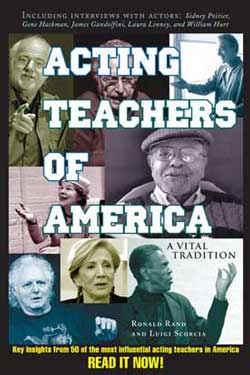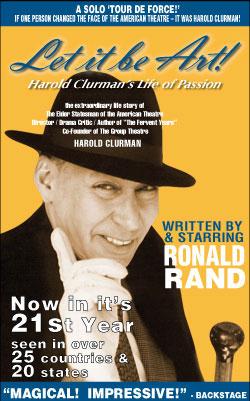Maia Danziger
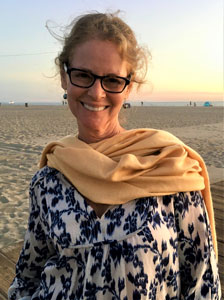 is an Emmy Award winning actress whose career has spanned nearly five decades. Originally from New York, Ms. Danziger has appeared extensively on and off-Broadway, in regional theatre and on film and television. She been teaching her master workshop ‘Relax and Write’TM and guided meditation workshops for more than twenty years. She has taught workshops for a variety of organizations including hospitals, wellness communities, universities, spas and corporations. A certified life coach, Ms. Danziger specializes in working with writers and artists on developing creativity and fulfilling their careers. Her clients include actors, artists, journalists, novelists, playwrights and screenwriters. She has had long-running contract roles on several daytime soap operas, including as Glenda Toland on “Another World,” Katie Whitney on “The Doctors” and Judy Barclay on “All My Children.” Ms. Danziger has been privileged to work with such actors as Vanessa Redgrave, Alan Arkin, Oliver Reed, Stephen Lang, Sarah Jessica Parker, Cynthia Nixon, Jonathan Pryce, Ann Jackson and Eli Wallach. Ms. Danziger was the founder and former co-Artistic Director of the Actors Company Theatre (T.A.C.T.) in New York City, and a member of Rogue Machine Theatre and Theatre Tribe in Los Angeles. Ms. Danziger is a practicing Buddhist since 1979, she has received the Kalachakra Initiation from His Holiness, the Dalai Lama, twice as well as initiation in the Bon tradition from Geshe Nyima Dakpa Rinpoche and His Holiness, 33rd Menri Trizin Lungtok Tenpal Nyima, the spiritual leader of The Bon.
is an Emmy Award winning actress whose career has spanned nearly five decades. Originally from New York, Ms. Danziger has appeared extensively on and off-Broadway, in regional theatre and on film and television. She been teaching her master workshop ‘Relax and Write’TM and guided meditation workshops for more than twenty years. She has taught workshops for a variety of organizations including hospitals, wellness communities, universities, spas and corporations. A certified life coach, Ms. Danziger specializes in working with writers and artists on developing creativity and fulfilling their careers. Her clients include actors, artists, journalists, novelists, playwrights and screenwriters. She has had long-running contract roles on several daytime soap operas, including as Glenda Toland on “Another World,” Katie Whitney on “The Doctors” and Judy Barclay on “All My Children.” Ms. Danziger has been privileged to work with such actors as Vanessa Redgrave, Alan Arkin, Oliver Reed, Stephen Lang, Sarah Jessica Parker, Cynthia Nixon, Jonathan Pryce, Ann Jackson and Eli Wallach. Ms. Danziger was the founder and former co-Artistic Director of the Actors Company Theatre (T.A.C.T.) in New York City, and a member of Rogue Machine Theatre and Theatre Tribe in Los Angeles. Ms. Danziger is a practicing Buddhist since 1979, she has received the Kalachakra Initiation from His Holiness, the Dalai Lama, twice as well as initiation in the Bon tradition from Geshe Nyima Dakpa Rinpoche and His Holiness, 33rd Menri Trizin Lungtok Tenpal Nyima, the spiritual leader of The Bon.
How have you been coping with the enormous changes affecting all our lives?
I’ve kind of been used to working on my own and it’s involved a lot of time of working on all the ‘moving parts’ trying to get settled. Right now, I’m settling into an office space, setting up a desk, where we are up here in Maine. I have been continuing my classes, which have been online for the several years, but now my classes are bigger than ever before. It’s probably because it seems everybody is desperate to connect. But it's really been a beautiful sense of community and I feel lucky teaching these writing workshops and being connected to everyone; to have this regular connection of doing my workshops.
I’ve managed to be very busy at this time. It’s funny, when you're not working on a ‘normal schedule,’ all of a sudden you find out that there are more meals to be cooked and more things that you have to take care of and be aware of. So, it’s requiring a new kind of discipline and openness because we’re being asked to take time out of our ‘normal’ lives. It's also been more joyful through this time of survival in a sense, since I’ve had the chance to talk more with artist friends and it really gives you a chance to find out how much we all have in common with one another through the experience we're going through.
I watched your wonderful show in which you talk about your father who was a child prodigy, a well-known violinist who studied with Pablo Casals, and became a Broadway conductor and conducted the original production of “My Fair Lady” on Broadway for many years while you were growing up. Your mother was an abstract painter and a poet. That certainly must have an impact on you in many different ways. Did you think about becoming a musician or an artist instead of going into the theater?
I’m actually working on a second show to tell a different story. Both of my parents were exceedingly competitive and very much so with me as well. My mother was actually very jealous of my successes, which for some, is a typical ‘mother and daughter relationship.’ She was a frustrated performer and had a big narcissistic personality.
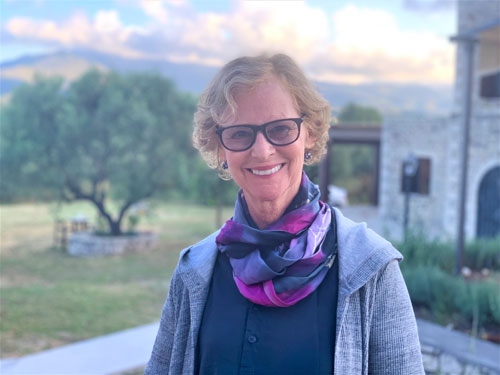
My father was ‘old world.’ If you weren’t a genius, well then you shouldn’t be anything. No, I didn’t think about going into music; I didn’t have perfect pitch and I got soured early but I was lucky enough to find the one thing that was mine – which was acting. So, I said: “Okay, I can do this.”
It was assumed that I would be in the arts and I found that acting was, in a sense, ‘untouchable’ from both of them. I remember when I was in my twenties, I had gotten a three-year contract on a soap opera, which was exceedingly exciting. At that time, my father was in the hospital; he had had a heart attack, and I went to visit him. I told him we could watch me on television. The soap I was on was airing, and he looked at me. He said: “I have no interest in that. Let me know when you’re doing a Chekhov play.”
He didn’t believe in anything ‘commercial,’ and he hated himself for selling out. I let it go but it was hard not to be hurt. That’s why I kept my life private from them. It wasn’t always safe to share the things I was going through.
But that’s exactly what I teach now and what I’m committed to. Teaching people how to grow in a safe space; it’s a whole lot easier. I say to them: “Let’s see what you got. So, you’ve written a poem and it’s in rhymes, that’s awesome!” If there’s anything I have learned the value of as a teacher (and as a parent), I would say I’ve learned what ‘not to do.’ It’s been very useful.
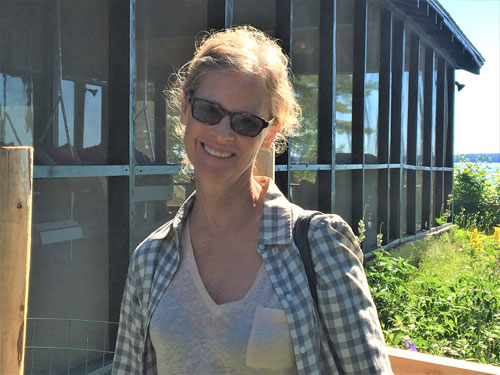
You also studied at New York University’s School of the Arts –
I only did a year in the Theatre School then I left because I was working as an actor. When I was there, I studied with really great people. It opened up a lot of opportunities for me. But I actually felt more comfortable working professionally because it was the time when people were doing a lot of drugs, ‘free love.’ Years later, when I went back to NYU, I was in the Gallatin Division and then in Creative Masters’ Program. I know I have been really lucky I was able to make my living as an actor.
When you were working on daytime soap soaps, how did you maintain your strength that was necessary for the long show taping every day?
It was a ‘killer’ schedule. I hadn’t ever been on a soap show before but when I was, I really couldn't do anything else. It is a very grueling schedule. You’re up at 5am, they’d pick me up at 5:30 and drive me to Brooklyn. “Another World’s” studios where we taped the show was out in Brooklyn, and it was like working in a bunker all day. Every night I was learning my lines for the show the next day.
When I got to the studio I had rehearsals all day, and then we’d tape the show from 4pm until 5pm; sometimes I didn’t get home until seven or later. There were no cuts, so we really taped the whole show. Every day was a tremendous learning experience for a young actress. Yes, you had to have incredible stamina to do an entirely new show every day, especially when there was a big storyline that went on for weeks.
There were some weeks where I’d just be on for a couple of days and that was a lot easier. It was an incredible discipline and it taught me what was necessary. I really had no other life; all the energies I put into doing the show every single day for three years. I also basically saved a lot of money; that’s how I was able to buy my first apartment by the time I was thirty.
You were the Founder and Co-Artistic Director of the Actors Company Theatre (T.A.C.T.) in New York City. What were you most pleased by how that all came together and also brought together so many singularly special theater artists.
I have always loved acting and I love the performing arts, in general. The seeds were really set in me very early on.
T.A.C.T. was my ‘baby,’ and I’m proud that it lasted for twenty-five years. I was the Co-Artistic Director for the first seven of those years, and I left it in great hands, and it grew and was nurtured; it had a beautiful arc. It was really a great opportunity to bring together like-minded New York actors. It all started because I didn’t want to go out of town to work; I had two children, but I wanted to keep working.
Some of my other friends also didn’t want to go out of town so performing at T.A.C.T. became a venue for all of us to stay together and work creatively. We were lucky enough to also create a strong audience who were strongly committed to coming to see us in lots of different plays. We all became part of a ‘theater community’ for so many years.
When I moved to Los Angeles, I would come back and watch shows, and people in the audience would come up to me and ask me where I had been and say how much they missed me. I eventually did come back to do a show.
It was always a beautiful artistic community with a great flow between the artist and the audience. It was all about the creative process of working on something larger than yourself, with a lot of life lessons in acting and for my life. My life has been so elevated by the creative things that I’ve been related to and I love passing it on.
And you have a book out: Relax & Write: Tapping the Unconscious for Life and Art adapted from your unique method, ‘Relax & Write.’ You describe it as “ a creative process for unlocking and co-creating with our unconscious and using the rich material there for life and art.”
I think the reason writing sparks me in the way it does is it gives us the opportunity to get to know ourselves as human beings. I think that’s how we really do find out about who we are. It’s through the telling of our stories, whether it’s fiction or non-fiction. We’re touching the core of what makes us human and we’re all related to that. Whether we have the same background or not. We’re all human beings experiencing life in our own ways.
I was saying to my students just the other day even though all of us are currently quarantining and it’s starting to get on everyone’s nerves and I can see people are ‘cracking a little bit.’ So I asked everyone to write ‘through their own lens,’ and there were ten people in the online writing group, and they all have their own world views, their own different perspectives of what’s happening but all of their experiences are related to all of us.
That’s what it’s really about. And it increases our ability to connect to the whole and that is what art does. It connects all of us to one another.
Someone sent me a video of Brian Stokes Mitchell singing “To Dream the Impossible Dream” from out of his apartment window several floors up from the street below where there were ‘First Responders’ below and he was singing that song from “Man of La Mancha,” and it could not have been a more relevant song, even though it was a musical from the 1960’s. That song is about the human plight that sadly that keeps repeating itself.
But it’s through our stories that we understand life, and maybe we can learn from our experiences and draw strength from it and maybe change the outcome.
Fairly recently, you’ve had the ‘amazing gift of life’ of meeting someone special and getting married.
It took me a long time. I can’t say we were expecting it particularly because we were both pursuing living out our lives happily fulfilled doing what we were doing but then you turn a corner, and unexpectedly something beautiful happens. That was a gift.
I will say, for both of us, the thing we did was accept the possibility; we didn’t shut down. A lot of it has to do with keeping a glimmer of hope always available, for the new information that might come along your way.
Maia Danziger and Michael Pressman
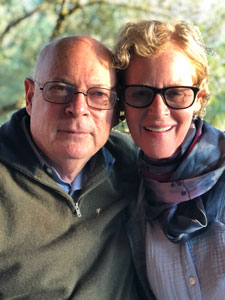 You’ve talked about “learning to be comfortable with the ebb and flow of everything that makes us human.”
You’ve talked about “learning to be comfortable with the ebb and flow of everything that makes us human.”
I’m naturally a curious person. So I say, let’s see what today might bring. I think wisdom comes with age. A lot of it has to do with not getting too high or too low; you want to find a nice middle range to see what happens. I feel that way about life. I try and stay open to the impulses in the moment.
For example, your show may have been delayed but it’s also the same story that’s happening to everyone right now. So, once you remain open enough in the moment to see what the next moment will bring without becoming too busy ‘pursuing,’ you’ll realize that there's a lot to do even when it feels like there’s nothing happening. It's all a matter of perspective.
What led you to the practice of meditation - and how does help your creative and personal life?
I stated mediating when I was eighteen. I have no idea how people manage without it. I really didn’t think I could do it, but I decided to commit myself to it. Now I can’t imagine my life without it. Better. I may sound like a very ‘loosey-goosey’ practitioner but I’ve been doing meditation for such a long time now, it’s in my bones, it’s in my DNA. I've trained myself in being comfortable enough to look at myself, to try and understand my own projections. Getting comfortable with the places that are uncomfortable inside and being able to try and reach an ‘exalted state’ for a moment.
When you’re able to sit with the ‘uncomfortable’ and see what happens and not run away from it but moving inside the fear and breathe into it, an understanding may come. That’s what it takes when you get inside deep creative work as well and seeing where that takes you. You can get lost in an inner landscape if you do it well. You have no control.
Our ‘western’ life trains all of us about having to have control over everything, but I believe deep creative work comes from being able to release yourself enough to let the unconscious come without editing. You can always go back and edit things later through various techniques you've learned, shaping it but you don’t have to control the flow.
When you’re in the middle of a creative work, it's like a piece of magic. When you’re out of control and something bigger is steering you, you lose yourself and something takes over. It’s about surrendering yourself to something bigger.
A lot of us have developed ways of controlling, to keep ourselves safe and that’s probably for a lot of reasons. We have a practice of wanting to be in a safe environment. But when you let yourself go, so much more potential comes.
It’s the same idea that a lot of gardeners hold when they're gardening. It’s another form of meditation. You’re connecting to something outside of yourself which is allowing your nervous system to calm down and certain hormones get released.
I think it’s a very good thing to have a practice like that. When I was eighteen years old, I began to meditate. I set a three-minute egg timer and promised myself I would meditate for exactly that time, but of course my body was racing but I meditated. I really wanted to understand what it was all about. So I continued, and I found that I could do it for five minutes, and then ten minutes, and then fifteen minutes. And when I went into a deep meditation an hour had passed and I didn’t know where I was; I was gone. But it was years before I realized I could do that.
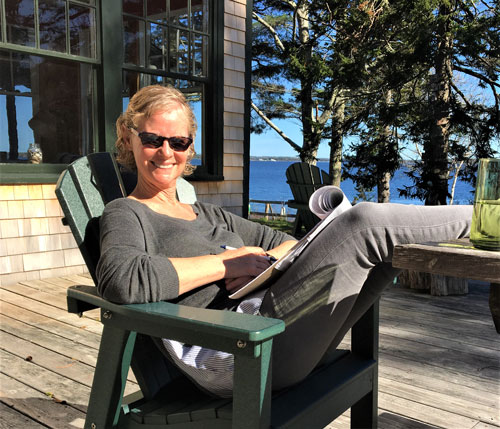
We have no other choice but to go forward as artists and human beings in a world incredibly different than anything we could have imagined.
I think it’s the idea of sharing in general. No one is alone and by sharing your words, your thoughts and your feelings and they’re held in safety and not in judgment, it allows us to connect with each other. To know that we’re not alone. When I’m having these workshops with my students online, we’re able to connect that way. It’s all about staying connected so that we can hear what we’re thinking, to allow ourselves to be vulnerable in a safe space and express our deepest thoughts in this way. And in this way we become a bigger container and we don’t feel like we’re in such isolation; we’re really in a much bigger sense of connection.
Another thing that’s occurred is I’ve never been so connected to my grandchildren. They have iPad and my ten-year old says to me: “I want to FaceTime with you. And we’re discussing things we didn’t know about each other. I didn’t know that we both like dark chocolate, who knew! He says: “This is so much fun!” So we’re talking about the things we’re doing and there’s so many gifts being given to us at this time even with everything we’re going through.
I went through a bout of breast cancer. I will say in the end, it was a wonderful gift. Of course, it was not a gift I’d ask for or that I wanted or that I’d wish on anyone, but it still became a gift with enormous benefits. And in the same way, it’s the same gifts that we’re being given now – to discover in the moment. And luckily we have this technology which brings everyone closer than they did during the 1918 Spanish Flu; they didn’t have this opportunity available to them. We’re very lucky in so many ways.








































